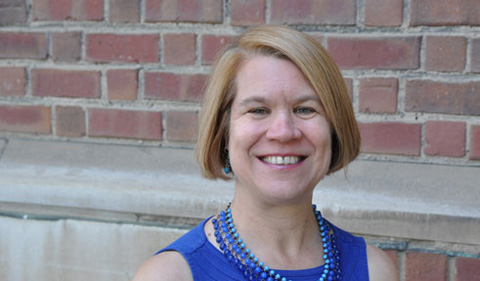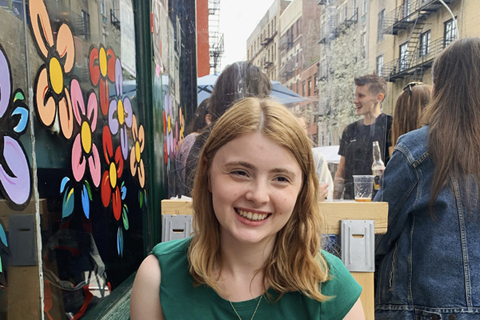By Alicia Hopkins ’18
This week’s A&S Spotlight focuses on Dr. Elizabeth Koonce, Assistant Professor and Undergraduate Advising Coordinator of English.
Your current job titles with Ohio University are Assistant Professor and Undergraduate Advising Coordinator. What appeals to you about these jobs?
First and foremost, I should say my primary job is that I’m a Group 2 Assistant Professor, which entails a contract of primarily teaching with some service. However, I volunteered to be the Departmental Undergraduate Advising Coordinator because I’m a people person. I absolutely love working with students, and this job is something that someone in the department has to do as a way to help important functions happen. My primary duties are to handle questions about people who want to change into the English major, assign advisers for oncoming students, look at DARS problems and DARS credits for incoming students, transfer student problems, questions about credit from study abroad…. This year, I led the departmental orientation. I am the primary person for incoming advising for new English majors. I also am involved with the orientation for the department. I feel like my job as advising coordinator is great because it means that I do that instead of teaching a few classes. I do that as a way to help promote the department. English education something I really believe in, and I think that it’s an important function.
What kinds of courses have you taught so far?
I would almost be willing to bet that I’ve taught more course preps than nearly anybody in my department. I have taught 28 different classes since I’ve been teaching at OHIO, and part of the reason is that I began my job as an adjunct, meaning that I was filling in for people in a variety of capacities before I got the full-time job. But the range of classes I’ve taught is everything from the composition classes, 1510, 3010J, 3060J, to introductory classes such as 2020 or 2010, all the way up to upper-level classes, 4060 (special topics), I’ve taught Middle Eastern writing, Oscar Wilde, British literature…. I used to teach in Women’s, Gender & Sexuality Studies, I am currently teaching the English DeparLearning Community. So, my experience is pretty deep, and what I learned is that teaching is absolutely something to be flexible and something to play with, and something that is fun, so I’m blessed that I’ve had all of these opportunities.
Which course has been your favorite to teach so far? What did you love about it?
I love multiple classes that I’ve taught. I can name three classes that have been really fantastic. One is, I absolutely love teaching the 3060J course that I teach about once a year on women and monstrosity. It’s absolutely fantastic. We get to bring together literature and pop culture and music and movie and videos and blogs. We talk about the concept about how the very definition of “women” can be quite monstrous; think “Barbie.” We look at female monsters; we look at the way that historically women have been cast as monsters. Think about Eve. Think about Medusa. And we talk about how female artists such as Lady Gaga or fairy-tale storyteller Angela Carter have embraced the monster trope and made it a symbol of female strength. I also love teaching the introductory Drama and Poetry class. I think they’re very important discourses, and there’s a lot of important vocabulary terms and things that students must know to succeed when they study these genres later. I absolutely love drama. I taught it more often than poetry, but I love poetry just as well. The students in introductory sequences are great. What I like about the poetry sequence is it’s very structured; 2010 doesn’t feel structured to me, so I like poetry and drama better than fiction and non-fiction in terms of the personal teaching.
It seems that many students think that talking with an adviser is only something to be done when they need help with scheduling. What other topics, areas of interest, or issues might you address with a student?
It’s my opinion that advising goes a bit beyond just the planning of classes for students. I think that advisers should attempt to make relationships with their students on all kinds of grounds. I absolutely love to find out what my students are doing in extra-curricular activities, what their professional goals are, how they’re spending their time, how they feel about Ohio. I think getting to know the whole student is an incredibly important part of advising. To be a good adviser, you need to be able to listen, and be human, and that’s something that I value very much.
As an English professor, could it be assumed that you are an avid reader or writer? What is the best book or other piece of literature that you have read this year? Of all time? What genre do you enjoy writing the most?
There are hundreds. Consider Midnight’s Children, Jane Eyre, Mill on the Floss, The Secret Life of Bees, Middlesex, and The Poisonwood Bible as potential options. This year, I’ve enjoyed reading the memoirs Wild and I am Malala, amongst MANY other books.
What advice do you have for students within the English major or minor? Any tips for success?
I think liberal arts students are lucky. We aren’t in a professional degree program where we’re moving along simply trying to fulfill practical aspects of a particular licensure. We have the ability to use our majors as a way to expand our minds, improve our worldview, think critically, write critically, and analyze. Basically being citizens of the world. However, since the degree is open-ended, it then becomes much more coincident on the student to express some kind of potential skills or interests to help that person rise above others in the job pool later on, so I would suggest that any English major who enters should do what he or she can to really make themselves be known as a potential job entity or graduate school entity, to seek out editing positions, perhaps on campus with Sphere, or to seek blogging opportunities or to put themselves out there to try to find opportunities to write editorials for the Post. We have a wonderful internship program here in the department where we offer job credit for students who intern in law offices, in public relations, in different media outlets and law offices. This allows students a leg up in comparison to other students when it comes to job searches, and gives potential graduate schools a sense that a student has a true motivation than, “Oh, I’ve just selected something because it’s here.”
What about students who may be considering a major or minor in English but, for whatever reason, aren’t sure they want to commit yet?
I think that it’s important to have honest conversations with advisers about what a particular person’s real interests are. But one thing I do know is that nobody is best serviced by having an undecided major. If you start out with an English major, and you need to change tracks, then at least you have a sense that you’re reacting against something, as opposed to, “I don’t know where I’m going and I’m like a fish in the pond, not knowing which stream to follow.” So I think that everybody should have a major, and it’s okay to switch majors, but it’s better to have a group to be of, than not have a group. In terms of the English major, I try to suggest advantages that happen with a liberal arts degree. Our students are good writers, good analyzers, good readers; any jobs or potential future plans that involve writing, reading, or thinking, this is the kind of major for you. But we also have a lot of majors who pursue second majors or are pursuing certificates or minors to help augment. Maybe they love English, but they want to have some kind of practical aspect on their resume, so they pursue a minor in Business or pursue a certificate in Global Learning Community, which is a study abroad type program that augments practical experience with a liberal arts degree. It does depend on the student, though.
How long have you been with Ohio University? What brought you here to Ohio University?
My husband and I came to Ohio University in 1993. I was 24 years old then, and I was actually a middle school French teacher. What brought us here was that my husband got a tenure track job in industrial engineering, and because I was married to him, I came here with him as well. It was a short time later that I decided that since I could not find a teaching job, I would seek a Ph.D. here. Ph.D.’s are free for faculty spouses, and so it worked out pretty well.
To suggest a student or a staff or faculty member for the A&S Spotlight, please contact Alicia Hopkins at ah828712@ohio.edu.




















Comments